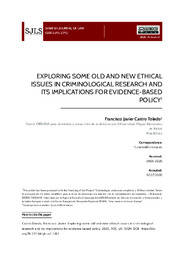Por favor, use este identificador para citar o enlazar este ítem:
https://hdl.handle.net/11000/27409
Exploring some old and new ethical issues in criminological research and its implications for evidence-based policy
Título :
Exploring some old and new ethical issues in criminological research and its implications for evidence-based policy |
Autor :
Castro Toledo, Francisco Javier |
Editor :
Universidad Miguel Hernández de Elche |
Fecha de publicación:
2020-12-01 |
URI :
http://hdl.handle.net/11000/27409 |
Resumen :
Interest in the development of evidence-based policies for the public management of the control and treatment of crime seems to be the position that will become dominant in the coming years. In this context, it is important for policy makers to know that while social research is surrounded by many ethical dilemmas, criminological research, because of the particular sensitivity of its subject matter and the profound implications of its findings, must emphasise the responsibility of researchers and provide criteria and principles that properly guide their research. To respond to this new context, this paper introduces, as examples of its variety, some of the traditional ethical challenges of criminological research, such as the effective obtaining of consent, as well as some of the new challenges involved in the use of predictive algorithms by criminal justice system operators. We conclude by highlighting the necessity of considering the ethical dimension of criminological research as one of the necessary elements that legislators must assess to critically accept scientific evidence as legitimate.
|
Palabras clave/Materias:
Ethics
Evidence-based policy
Criminology
Informed consent
Data |
Área de conocimiento :
CDU: Ciencias sociales: Derecho |
Tipo documento :
application/pdf |
Derechos de acceso:
info:eu-repo/semantics/openAccess
Attribution-NonCommercial-NoDerivatives 4.0 Internacional |
DOI :
https://doi.org/10.21134/sjls.vi2.1287 |
Aparece en las colecciones:
Spanish Journal of Legislative Studies (SJLS) Núm. 2 (2020)
|
 La licencia se describe como: Atribución-NonComercial-NoDerivada 4.0 Internacional.
La licencia se describe como: Atribución-NonComercial-NoDerivada 4.0 Internacional.
 La licencia se describe como: Atribución-NonComercial-NoDerivada 4.0 Internacional.
La licencia se describe como: Atribución-NonComercial-NoDerivada 4.0 Internacional.
.png)
